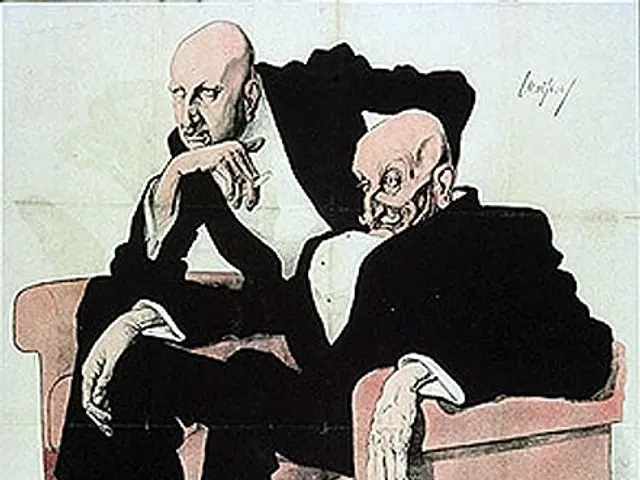Urgent Appeal from Former President Wulff: Reviewing AfD Ban Necessary in Light of Historical Lessons
Investigating the potential banning of the AfD party instigated by President Wulff's call for action - Review sought for AfD party ban by ex-German President Wulff
Wanting a thorough reevaluation of the AfD's continued operation, former Federal President Christian Wulff has raised concerns about the right-wing extremist party's actions underlying the democratic structure. This call was made at the Ludwig-Erhard summit in Gmund on the Tegernsee, where Wulff emphasized the need for further legal opinions to initiate an efficient party ban procedural process.
A sobering reminder: The missed ban of the NSDAP in 1930
Wulff drew parallels between the failure to impede the Nazi Party (NSDAP) in 1930 and today's AfD debate. In 1930, astute officials recognized the NSDAP as a threat to democracy, yet procedural and political constraints prevented its ban. This missed opportunity gave rise to the subsequent- and tragic- catastrophe of World War II.
The stakes are high: Protect democracy instead of regret
Wulff calls on Germany to take a hard stance against the AfD to prevent a reoccurrence of the past. If, after careful examination, a ban application is deemed appropriate, action must be taken, he insists. "Germany must never again allow democracy to fail, as it did in 1933," Wulff concluded.
The populous AfD, a modern-day enigma?
The Alternative for Germany (AfD), founded in 2013, represents a populist right-wing party that some critics view as promoting extremist elements. Comparisons to the NSDAP’s nationalist and anti-democratic discourse can be drawn, but the historical contexts vary significantly. Debates about whether the AfD poses a danger to Germany's democratic order similar to the NSDAP are heated and ongoing.
Watchful eyes and democratic safeguards
In contrast to the Weimar Republic, post-WWII Germany's legal framework has provisions for the Federal Constitutional Court to ban parties seeking to undermine democracy. The state security apparatus monitors radical elements within parties like the AfD, justifying any potential ban. Striking a balance between democratic freedoms, pluralism, and freedom of speech is essential, but preventing anti-democratic forces from gaining power remains crucial.
In essence, learning from the fateful missed ban of the NSDAP in 1930 illuminates the importance of prompt and decisive action against extremist threats to democracy. The ongoing discourse about a potential AfD ban is a testament to this lesson, as the political landscape balances democratic rights with the need to protect the constitutional order. A strong institutional framework now aims to prevent repeating the catastrophic mistakes of the past.
- Christian Wulff
- AfD
- Classification
- Gmund
- Tegernsee
- NSDAP
- Democracy
- Ban debate
- Constitutional protection
- CDU
(References not included in final output for brevity)
- Former President Christian Wulff, at the Ludwig-Erhard summit in Gmund on the Tegernsee, has urged for a reevaluation of the AfD's continued operation, expressing concerns about the party's actions undermining democratic structure.
- Wulff drew parallels between the failure to ban the NSDAP in 1930 and today's AfD debate, emphasizing the need for Germany to learn from historical lessons to prevent a reoccurrence of the past.
- If, after careful examination, a ban application is deemed appropriate, action must be taken, insists Wulff, to protect democracy instead of regretting inaction like the historical missed ban of the NSDAP in 1930.
- The Alternative for Germany (AfD), founded in 2013, is a populist right-wing party that some critics view as promoting extremist elements, drawing comparisons to the NSDAP’s nationalist and anti-democratic discourse.
- Post-WWII Germany's legal framework has provisions for the Federal Constitutional Court to ban parties seeking to undermine democracy, with the state security apparatus monitoring radical elements within parties like the AfD, justifying any potential ban.






